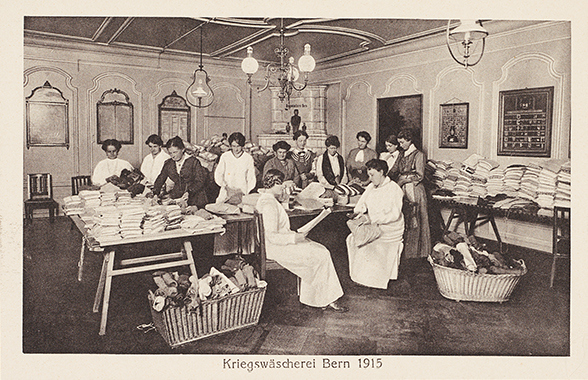The First World War drastically changed Switzerland, both in terms of its supply and the management of its workforce. Through their involvement during the conflict, women played a key part in the functioning of the country, paving the way for female emancipation and for women to play a greater role in the economy.
The general mobilisation of 1914 saw a shake-up of roles across various sectors. In the absence of their husbands and sons, women had no choice but to replace men where they were most needed. This influx of women into the workplace was all the more vital given that conscripts’ pay and rare allowances were not enough for a household to live on.
A trend that was not entirely new
The presence of women in this fraught economic context varied by sector: while a farmer sent to the front could rely on his wife or parents to look after the farm in his absence, things were different for salaried workers. In the manufacturing sector, particularly the watchmaking industry, women already made up an integral part of factories, accounting for around a third of staff between the beginning of the century and 1910. This figure rose to nearly 40% during the interwar years.

The two Swiss exhibitions on women’s work
Two exhibitions on women’s work (known as SAFFAs, which is the German acronym) were organised in Bern in 1928 and Zurich in 1958 by feminist associations. The first highlighted the difficult working conditions for women in Switzerland in the post-war years, while presenting the advantages of women’s work to the economy. The exhibition also strongly supported emancipation in terms of the right to vote. The second exhibition focused on the opportunities for women to have a job, to get an education and on consumption in general. In addition, the contributions of women were presented as essential to the functioning of the country.
Three key activists
Margarethe Hardegger, Dora Staudinger and Else Züblin-Spiller each worked in their own way towards the recognition of women’s rights during this period.
Margarethe Hardegger fought for women’s rights her whole life. She founded her first union in 1904 and two years later became the first secretary of the Swiss Trade Union Federation (USS). She fought against social inequality and labour exploitation, which mainly affected working class women. As a champion of sexual freedom, the right to contraception, and abortion, her ideas were far from conventional for the time. A pacifist, she advocated the abolition of the armed forces. She also instigated the creation of agricultural communities and was committed to the fight for women’s suffrage.
Else Züblin-Spiller started off as a political journalist, before getting involved in the fight against poverty. In 1914, when the First World War broke out, she founded the Swiss Association for Soldiers’ Welfare which provided affordable, balanced meals without alcohol in ad hoc venues. Based on the same model, she established canteens in factories. In 1916, she set up the soldiers’ aid service. She was also involved in the women’s movement, encouraging women to work and take part in the SAFFA exhibition.
Dora Staudinger was a German activist who settled in Zurich in 1912. She was one of the few women in Switzerland to have played an important part in the housing reform movement, in particular through the “Allgemeine Baugenossenschaft Zürich” (ABZ) cooperative, founded in 1916. In 1913, she founded the first women’s cooperative in the “Lebensmittelverein Zürich” (Zurich consumer cooperative). She became a member of the socialist party in 1914, and with Clara Ragaz set up the Swiss arm of the Women’s International League for Peace and Freedom in 1915. She also championed the needs of housewives.
Bibliography and sources
- De Weck, Hervé; Roten Bernard. Jura et Jura bernois pendant la Première Guerre mondiale. Porrentruy: Editions D+P ; Société jurassienne des officiers, 2017.
- Lachat, Stéphanie. Les pionnières du temps : vies professionnelles et vies familiales des ouvrières de l’industrie horlogère suisse (1870–1970). Neuchâtel: Edtions Alphil-Presses universitaires suisses, 2014.
- Voegeli, Yvonne. Saffa. In: Dictionnaire historique de la Suisse [en ligne]. Version of 07.06.2016.
On Margarethe Hardegger
- Bochsler, Regula. Ich folgte meinem Stern: das kämpferische Leben der Margarethe Hardegger. Zürich: Pendo-Verlag, 2004.
- Bochsler, Regula. Margarethe Hardegger. In: Historical Dictionary of Switzerland [online]. Version of 21.01.2021
- Boesch, Ina. Gegenleben: die Sozialistin Margarethe Hardegger und ihre politischen Bühnen. Zürich: Chronos-Verlag, 2003.
- Schindler, Patrick. Vie et luttes de Margarethe Faas-Hardegger : anarchiste, syndicaliste & féministe suisse : pour le centenaire de « L'Exploitée », 1907–2007. Paris: Editions du Monde libertaire, 2007.
On Else Züblin-Spiller
- Ludi, Regula. Else Züblin-Spiller. In: Historical Dictionary of Switzerland [online]. Version of 12.04.2021
- Schnyder, Moia. Zwei Pionierinnen der Volksgesundheit: Susanna Orelli-Rinderknecht, 1845–1939; Else Züblin-Spiller, 1881–1948. Wetzikon: AG Buchdruckerei Wetzikon, 1973.
- Parzer-Epp, Verena. Else Züblin-Spiller (1881–1948). In: Pionnières de la Suisse moderne : des femmes qui ont vécu la liberté. Genf: Slatkine, 2014, S. 221–223.
On Dora Staudinger
Last modification 18.11.2021
Contact
Swiss National Library
SwissInfoDesk
Information Retrieval Service
Hallwylstrasse 15
3003
Bern
Switzerland
Phone
+41 58 462 89 35
Fax
+41 58 462 84 08





